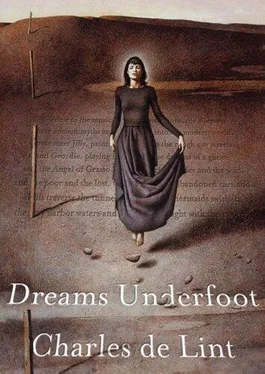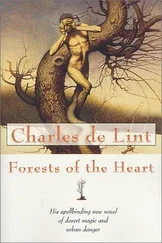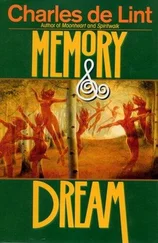The first officer nodded. “I don’t know which of them was worse: Cross with that monstrous face, or Boddeker.”
“Poisoned her whole family, didn’t she?”
“Yeah, but I remember seeing what Cross did to the shrink—just about tore the poor bastard in two.”
“I heard that it was Boddeker who put him up to it. The poor geek doesn’t have a mind of his own.”
Vaguely, as though observing the action from a vast distance, Harriet could sense the first officer looking in her direction.
“She’s lucky she’s still alive,” he added, looking back at his companion.
In the days that followed, researching old newspapers at the library, Harriet found out that all that the two men had said, or that she’d dreamed they had said, was true, but she couldn’t absorb any of it at the moment. For now she just drifted away once more, entering a troubled sleep that was plagued with dreams of ghosts and monsters. The latter wore masks to hide the horror inside them, and they were the worst of all.
She woke much later, desperately needing to pee. It was still dark in her room. Outside she could hear the wind howling.
She fumbled her way into the bathroom and did her business, then stared into the mirror after she’d flushed. There was barely enough light for the mirror to show her reflection. What looked back at her from the glass was a ghostly face that she almost didn’t recognize.
“Monsters,” she said softly, not sure if what she felt was pity or fear, not sure if she recognized one in herself, or if it was just the old woman’s lunatic calm still pointing an accusing finger.
She stared at that spectral reflection for a very long time before she finally went back to bed.
“We’ll find you another,” the old woman said.
Her tea had gone cold but she was too tired to relight the stove and make herself another cup. Her hand were folded on her lap, her gaze fixed on the tin can of cold water that still sat on the stove. A film of ice was forming on the water.
“You’ll see,” she added. “We’ll find another, but this time we’ll put her together ourselves, just the way your father did with you. We’ll take a bit from one and a bit from another and we’ll make you the perfect mate, just see if we don’t. I always was a fair hand with a needle and thread, you know—a necessary quality for a wife in my time. Of course everything’s different now, everything’s changed.
Sometimes I wonder why we bother to go on ....”
The monster stared out the window to where the snow still fell, quietly now, the blizzard having moved on, leaving only this calm memory of its storm winds in its wake. He gave no indication that he was listening to the old woman, but she went on talking all the same.
Ghosts Of Wind And Shadow
There may be great and undreamed of possibilities awaiting mankind; but because of our line of descent there are also queer limitations.
—Clarence Day, from This Simian World
Tuesday and Thursday afternoons, from two to four, Meran Kelledy gave flute lessons at the Old Firehall on Lee Street which served as Lower Crowsea’s community center. A small room in the basement was set aside for her at those times. The rest of the week it served as an office for the editor of The Crowsea Times, the monthly community newspaper.
The room always had a bit of a damp smell about it. The walls were bare except for two old posters: one sponsored a community rummage sale, now long past; the other was an advertisement for a Jilly Coppercorn onewoman show at the The Green Man Gallery featuring a reproduction of the firehall that had been taken from the artist’s In Lower Crowsea series of street scenes. It, too, was long out of date.
Much of the room was taken up by a sturdy oak desk. A computer sat on its broad surface, always surrounded by a clutter of manuscripts waiting to be put on diskette, spot art, advertisements, sheets of Lettraset, glue sticks, pens, pencils, scratch pads and the like. Its printer was relegated to an apple crate on the floor. A large cork board in easy reach of the desk held a bewildering array of pinnedup slips of paper with almost indecipherable notes and appointments jotted on them. Postits laureled the frame of the cork board and the sides of the computer like festive yellow decorations. A battered metal filing cabinet held back issues of the newspaper. On top of it was a vase with dried flowers—not so much an arrangement as a forgotten bouquet. One week of the month, the entire desk was covered with the current issue in progress in its various stages of layout.
It was not a room that appeared conducive to music, despite the presence of two small music stands taken from their storage spot behind the filing cabinet and set out in the open space between the desk and door along with a pair of straightbacked wooden chairs, salvaged twice a week from a closet down the hall. But music has its own enchantment and the first few notes of an old tune are all that it requires to transform any site into a place of magic, even if that location is no more than a windowless office cubicle in the Old Firehall’s basement.
Meran taught an old style of fluteplaying. Her instrument of choice was that enduring cousin of the silver transverse orchestral flute: a simpler wooden instrument, sideblown as well, though it lacked a lip plate to help direct the airstream; keyless with only six holes. It was popularly referred to as an Irish flute since it was used for the playing of traditional Irish and Scottish dance music and the plaintive slow airs native to those same countries, but it had relatives in most countries of the world as well as in baroque orchestras.
In one form or another, it was one of the first implements created by ancient people to give voice to the mysteries that words cannot encompass, but that they had a need to express; only the drum was older.
With her last student of the day just out the door, Meran began the ritual of cleaning her instrument in preparation to packing it away and going home herself. She separated the flute into its three parts, swabbing dry the inside of each piece with a piece of soft cotton attached to a fluterod. As she was putting the instrument away in its case, she realized that there was a woman standing in the doorway, a hesitant presence, reluctant to disturb the ritual until Meran was ready to notice her.
“Mrs. Batterberry,” Meran said. “I’m sorry. I didn’t realize you were there.”
The mother of her last student was in her late thirties, a striking, welldressed woman whose attractiveness was undermined by an obvious lack of selfesteem.
“I hope I’m not intruding ... ?”
“Not at all; I’m just packing up. Please have a seat.”
Meran indicated the second chair, which Mrs. Batterberry’s daughter had so recently vacated. The woman walked gingerly into the room and perched on the edge of the chair, handbag clutched in both hands. She looked for all the world like a bird that was ready at any moment to erupt into flight and be gone.
“How can I help you, Mrs. Batterberry?” Meran asked. “Please, call me Anna.”
“Anna it is.”
Meran waited expectantly.
“I ... it’s about Lesli,” Mrs. Batterberry finally began.
Meran nodded encouragingly. “She’s doing very well. I think she has a real gift.”
“Here perhaps, but ... well, look at this.”
Drawing a handful of folded papers from her handbag, she passed them over to Meran. There were about five sheets of neat, closelywritten lines of what appeared to be a school essay. Meran recognized the handwriting as Lesli’s. She read the teacher’s remarks, written in red ink at the top of the first page—“Well written and imaginative, but the next time, please stick to the assigned topic”—then quickly scanned through the pages. The last two paragraphs bore rereading:
Читать дальше












